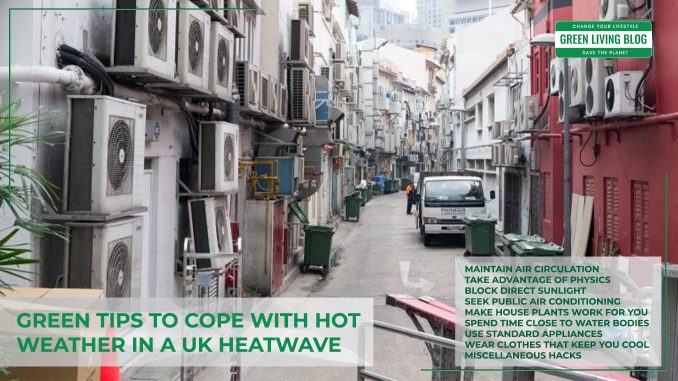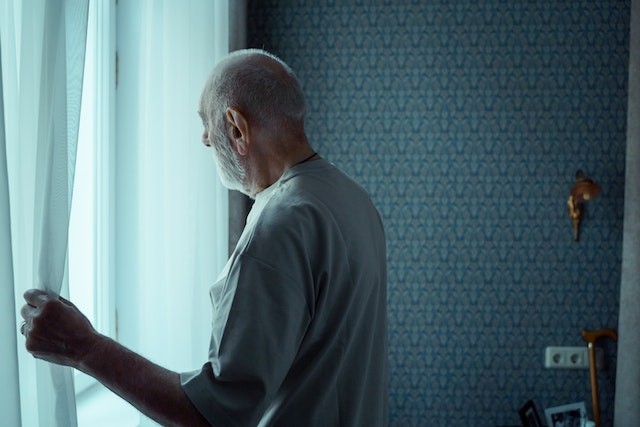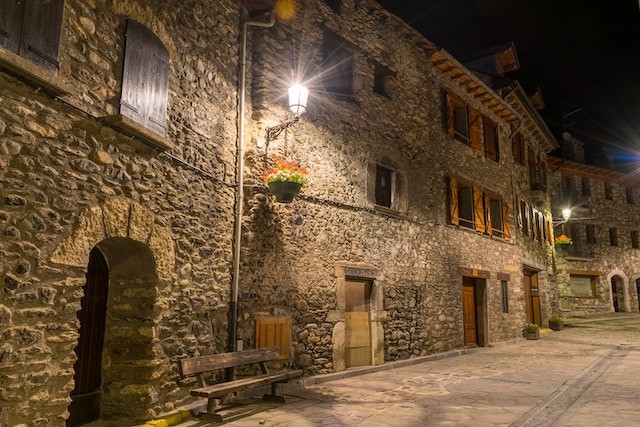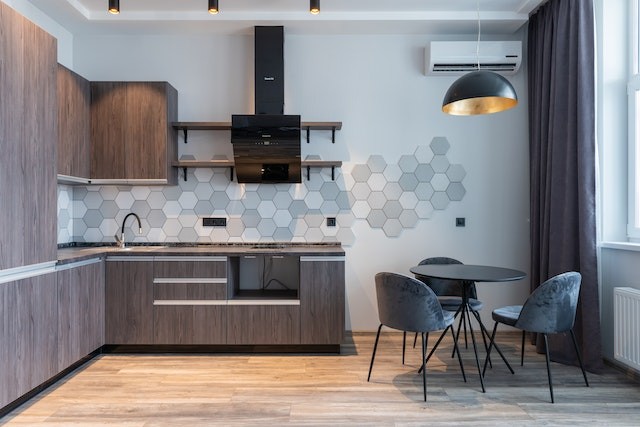
That is not a town in Surrey yet. But it could well be. It’s how south and southeast Asia copes with continued warm weather—every house has at least one air conditioning unit peeking out in the street.
The scorching heat this summer was a temptation for many in the UK to explore the idea of air conditioning.
Not that you’d need data as evidence, but still…
YouTube searches for ‘air conditioning’ are rollicking on whenever heatwaves hit us.
 According to the latest findings, global warming and climate change played a part in the last three heatwaves in the UK and many more across the world including devastating wildfires.
According to the latest findings, global warming and climate change played a part in the last three heatwaves in the UK and many more across the world including devastating wildfires.
You can see how much the earth has warmed since recordings began in the below animation from NASA shared by the BBC via Instagram:
View this post on Instagram
Across the English Channel, France battles serious wildfires like the one in Gironde, burning down 18,000 acres of forest, and displacing 10,000 inhabitants, and many other European countries are faced with severe consequences of climate changes as the UN Office for Disaster Risk Reduction tweets:
Major tourist sites are succumbing to the impacts of climate change – here’s how we save them https://t.co/XSyeNPcxZB pic.twitter.com/l31KdEY0DI
— UNDRR (@UNDRR) January 8, 2023
Why are there more UK Heatwaves?
The planet is warming, and the effects are visible. The slow but steady increase in the temperature of the earth’s atmosphere is beginning to affect the UK far sooner than anticipated, but global warming activists have shared their predictions since the early 1980s.
What seems to be an outlier event is here to stay. Nature just revised the thermostat setting.
- Heat waves would be a fact of life from now. Temperatures above 35°C in summer can be expected to happen with regularity in the UK.
- Heatwaves with temperatures touching 40°C would be more commonplace here. According to Professor Stephen Belcher, Chief Scientist, Met Office, it could happen once every three years.
- The government appears unprepared, understaffed, and ill-equipped to handle such a climate emergency. The wrangling over Brexit, the pitiful state of inflation, a war in Europe, geopolitical instability—man-made catastrophes are too many for nature to get her toe in the doors of Whitehall. But she is in no mood to wait.
Therefore, citizens need to find ways to deal with expected heat waves themselves. However, to counteract further global warming, greener ways should be used, so let’s uncover some.
What are your green Options to cope with a Heatwave in the UK?
Here goes…
1. Maintain Air Circulation

Homes in the UK are well insulated in general, and the UK government offers green home funds to improve insulation in all households. They are designed to maintain the warmth generated inside and the cold air outside. However, insulation also helps to keep houses cool inside when it’s hot outside.
Fresh air should circulate through your house in the coolest hours of the day, which tends to be night obviously. Open the windows and let air circulate during those hours. In case safety is a concern, keep it open in the early morning and before you go to bed. A perfect environment-friendly way to get a good night’s rest.
2. Take Advantage of Physics

Warm air rises and cold air sinks. Ensure that windows at the top of your house are open and a door or window at ground level is open. If you have an attic or a loft, open the windows there.
This will allow the hot air accumulated at the top of the house during the day to flow instead of accumulating. It will be replenished by cooler air flowing in at ground level.
If you live in an apartment, open a window and the main door to allow cross ventilation (one inlet and one outlet). The air will come in through the window and exit via the common hallway.
3. Block direct Sunlight

Sunlight heats through radiation. If the hot air stays inside a closed room, it literally becomes an oven.
As time goes by, the heat is absorbed by furniture and mattresses, making it harder to cool down the house when you return home.
You need a sunny, well-lit room, not a sun-baked one. Close blinds or curtains on windows to stop direct sunlight heating up your rooms during the day.
4. Seek Public Air Conditioning
You can find air conditioning in malls and some public community centres.
Indeed, public air conditioning is not as prevalent in the UK as in the USA. The London Tubes were not air-conditioned as late as 2018 and parts still are not. However, the recently launched Elizabeth Line offers fully air-conditioned carriages and a few other lines do too, which you can see in the below tube map from Londonist:
Tube too hot? Use this map to find the air-conditioned tube lines and stay cool underground https://t.co/eJvBBzj6np pic.twitter.com/uPjLQOKhYY
— Londonist (@Londonist) July 25, 2018
Even some hospitals lack air conditioning except in operating theatres.
But we bet that before next summer rolls around, you are going to find a lot more public spaces outfitted with air conditioning. Until then make your way to the nearest shopping mall and spend time shopping, reading, or working from your laptop if you can.
5. Make House Plants work for you

Ivy keeps houses cool – did you know?
Plants not only add to the aesthetics but also cool the interior. If you want to beat the heat with greenery, you are not only saving the planet but also your bank balance.
When plants give off the water in a process called transpiration, they cool the surroundings.
With their large leaves, species such as the Snake Plant (Sansevieria), Rubber Plant (Ficus Elastica), Chinese Evergreen (Aglaonema), and Palms (Arecaceae) are highly suitable.
Not only is the greenery soothing for the eyes, but it also cleanses the air of pollutants. After a day in the scorching sun, there is nothing like sipping a cold lemonade beside your cooling house plants.
6. Spend time close to Water Bodies

Large water bodies bring down the surrounding temperature. They affect the microclimate by causing more evaporation.
Evaporation draws latent heat out of the area, causing it to cool down by several degrees.
If you are lucky enough to live close to a lake, river, or reservoir, spending time beside it might be an ideal solution to make the summer more bearable.
Larger water bodies also contribute to a refreshing breeze from time to time, due to the land-water temperature differential.
7. Use standard Appliances to manage the Heat

Air conditioning is not the answer to heat waves. An average-sized air conditioner needs between 6 and 10 kWh to operate. That would not only make your energy bills hefty but also add to global warming, the very calamity you are seeking respite from.
Note: a medium-sized fridge consumes 100 watts while a 1.5-ton air conditioner uses 1500 watts. Using a fridge keeps food fresh, prevents diseases, and saves time taken daily for shopping. The trade-off is significantly better.
But that’s not all. The fridge can help you beat the worst of the heatwave in other ways.
Freeze a water bottle. Dump it in a thick backpack and wear it while you’re outside. The cool touch of the frozen bottle will keep you cool. And as the water melts, you’ll have an icy mouthful every 10 minutes.
We’ve heard from folks who froze their socks and pillow covers! Go ahead, try it – you all might normalize this for the next heatwave.
What about ceiling fans?
Though ceiling fans are an ideal solution for dispelling heat, they also need a firmly anchored hook and at least 3m tall ceilings. At an average ceiling height of 2.4 m, UK houses are ill-equipped to host them. So, learn the best use of pedestals and tower fans. Some peculiarly specific ideas await you at Lifehacks; try them.
8. Wear Clothes that keep you cool

Choose clothes carefully because dark shades absorb heat while light shades reflect heat. Ensure they’re loose-fitting and allow the skin to breathe.
If possible, avoid a suit and necktie. Wear natural fibers such as cotton and silk. Synthetics do not wick away sweat and can cause heat exhaustion.
9. Miscellaneous Hacks
- Remember to cover yourself in long sleeves with light fabrics.
- Reduce intake of caffeine—coffee, tea, energy drinks, and colas, they are diuretic and cause frequent urination and dehydration.
- During the worst days, less activity is better than more. Unless you are sure of your fitness levels, cut back on daily jogging or a 10 km bike ride in the sun. Sweating can make you weak suddenly through the loss of electrolytes.
Final Thoughts
With temperatures forecast to rise in the future, the temptation for shortcuts such as buying an air conditioner will increase.
But we want to leave a habitable planet for future generations, not an inhospitable wasteland.
Living greener now would go a long way to fulfilling that dream.
![]()
Author Profile
- Online Media & PR Strategist
- Blogger and Educator by Passion | Senior Online Media & PR Strategist at ClickDo Ltd. | Fascinated to Write Lifestyle Blogs in News & Education I have completed a journalism summer course at the London School of Journalism and manage various blogs.
Latest entries
 LeisureApril 16, 202510 Best Green UK Hotels for Eco-Tourists
LeisureApril 16, 202510 Best Green UK Hotels for Eco-Tourists Best practicesApril 14, 20258 Best Ways to Reduce Your Carbon Footprint
Best practicesApril 14, 20258 Best Ways to Reduce Your Carbon Footprint Green Expert GuidesMarch 28, 2025Lisbon Living: Where Sustainable Charm Meets Urban Energy
Green Expert GuidesMarch 28, 2025Lisbon Living: Where Sustainable Charm Meets Urban Energy EnvironmentJanuary 21, 2025Buying Eco-Friendly Homes: 6 Eco Questions to Ask Your Real Estate Agent
EnvironmentJanuary 21, 2025Buying Eco-Friendly Homes: 6 Eco Questions to Ask Your Real Estate Agent






Leave a Reply
You must be logged in to post a comment.